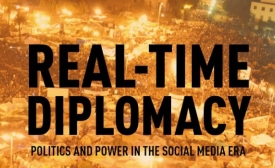social media
The use of social media for the purpose of public diplomacy has increasingly drawn the attention of U.S. diplomacy professionals, observers and political analysts especially after the recent attacks on the U.S. embassies in Egypt and Libya that were triggered by outrage over an anti-Islamic video released on Sept. 11.
Last week, before the world caught on fire over a film clip, I wrote about the paradox of value promotion in public diplomacy. No matter how appealing promoting one’s values may be, trying to do so in a global arena is fraught with difficulty. Yet, because values are integral to a nation’s communication, public diplomacy will inevitably reflect those values. What’s happening between the U.S.
In the long term, a battle over value promotion is a no-win scenario in today’s global communication arena. To be savvy, public diplomacy strategists need to find ways to give voice and bring the public into the public diplomacy equation.
The murder of U.S. diplomats in Libya as an alleged reaction to a YouTube posting brings into focus serious differences in culture and values with many societies in the Muslim world. Acknowledging this fact is an essential step in tackling the gaps in the value of human life and religious symbols.
The notorious tweet reaffirming a statement that condemned "the continuing efforts by misguided individuals to hurt the religious feelings of Muslims" has been deleted by the U.S. Embassy in Cairo, but the incident raises a question that lingers: Is blasting out 140-character messages on Twitter a good way to conduct diplomacy, given the political, and even mortal, risks?
This summer, two groups of international food bloggers visited Israel for the first time on separate all-expense-paid trips, one of which was partially funded by the Tourism Ministry. The goal of these trips and similar ones planned for the future, organizers say, is to expose influential writers to Israel through something as seemingly apolitical as food - and to encourage them to share their impressions of Israeli cuisine and culture with their millions of followers.
Ten years ago, the Innocence of Muslims controversy would not have happened. YouTube did not exist, and without this means of reaching a global audience the offensive snippets of the “film” would never have been seen.

The USC Center on Public Diplomacy was pleased to present a book talk with CPD Director, Philip Seib, on his recently published book, “Real-Time Diplomacy: Politics and Power in the Social Media Era.”







